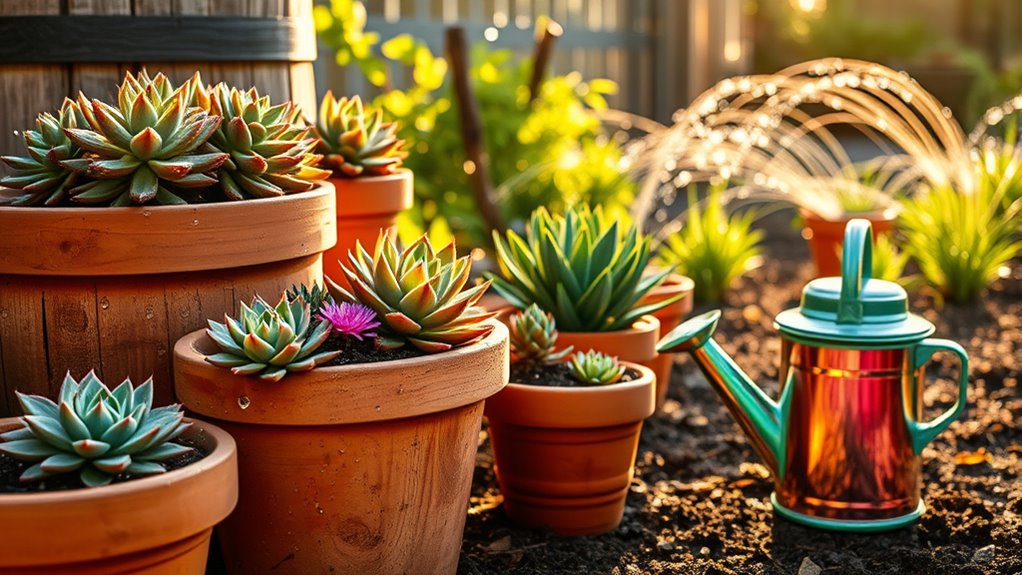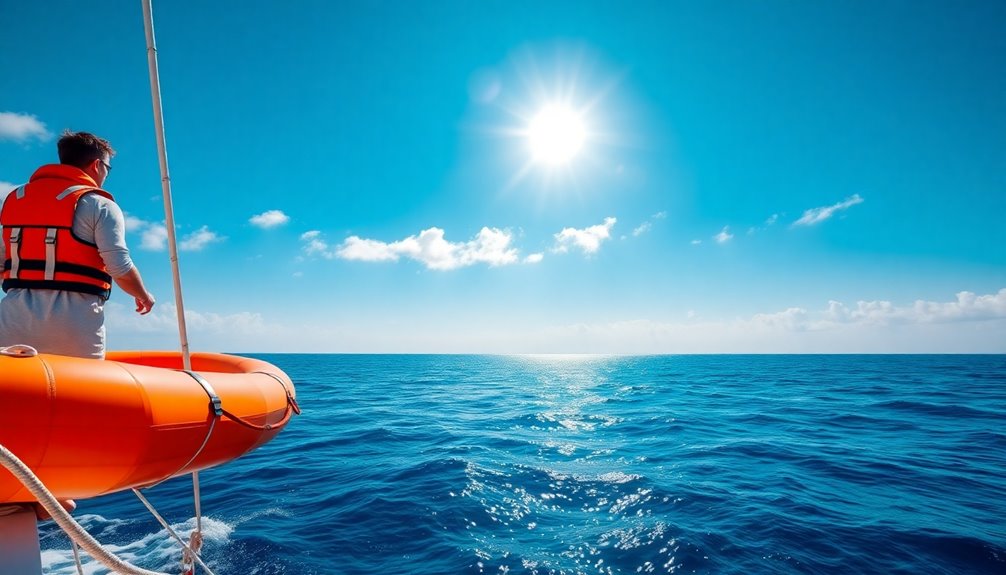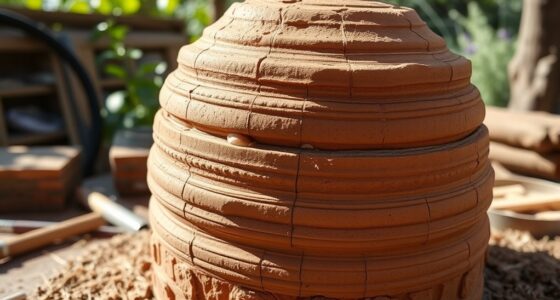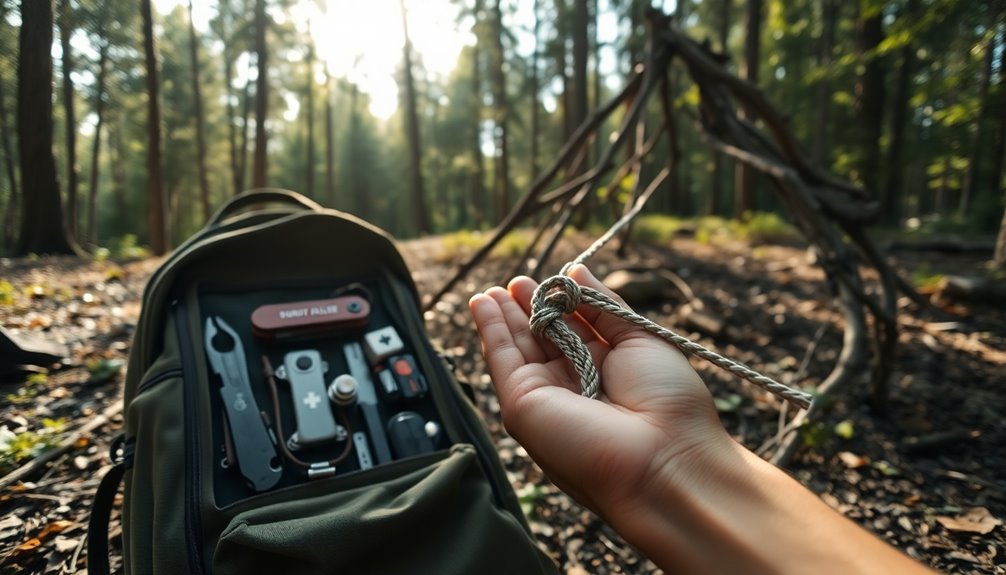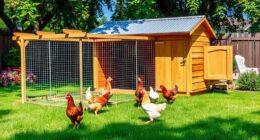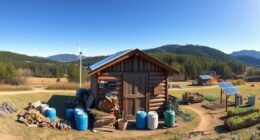During dry seasons, conserving water is essential. Start by fixing leaks, as they can waste thousands of gallons. Upgrade to water-efficient appliances, which use less while saving on bills. Limit your shower time to 5-10 minutes and collect leftover water when possible. Water your plants wisely with drip irrigation, and don't forget to implement mulch to retain moisture. These simple steps can make a significant difference, and there's more you can do to help your community conserve water effectively.
Key Takeaways
- Fix leaks immediately to prevent water waste and contribute to conservation efforts during dry seasons.
- Upgrade to water-efficient appliances to reduce overall water consumption and lower utility bills.
- Limit shower time to 5-10 minutes, saving up to 25 gallons of water per shower.
- Collect and reuse rainwater for irrigation or flushing toilets, potentially saving 1,300 gallons annually.
- Use drip irrigation and water plants early or late to minimize evaporation and maximize efficiency.
Fix Leaks Immediately
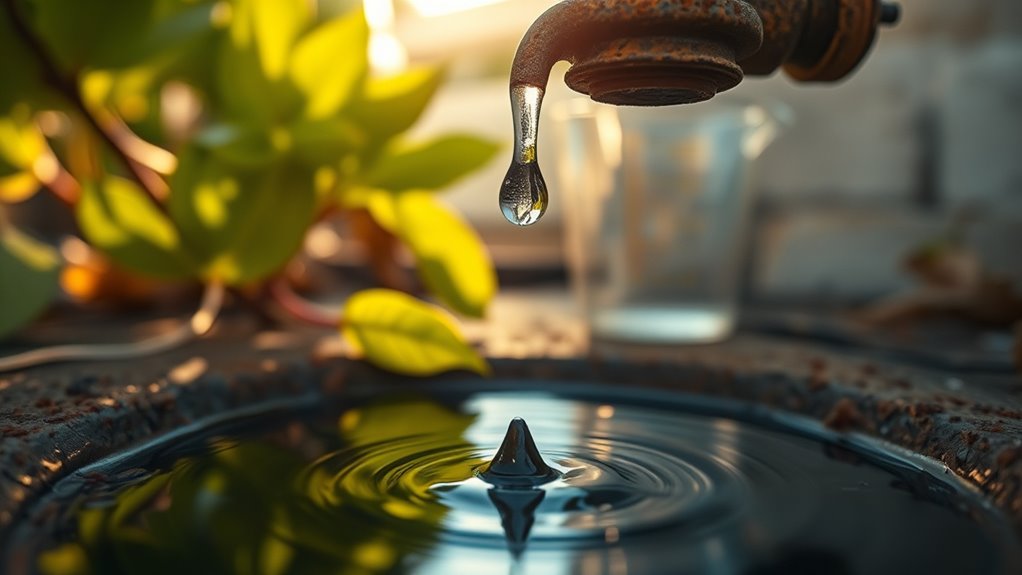
Don't let those pesky leaks drain your resources! Leaky faucets and pipes can waste over 10,000 gallons of water annually per household, so fixing leaks should be a top priority, especially during dry seasons.
Regular plumbing inspections help identify hidden leaks, ensuring you catch them before they escalate into costly repairs. Small leaks can lead to significant water waste, undermining your efforts in water conservation.
By addressing these issues promptly, you not only save water but also contribute to broader conservation efforts during droughts. Participate in initiatives like Fix a Leak Week each March to raise awareness and encourage your community to tackle leaks proactively.
Upgrade to Water-Efficient Appliances
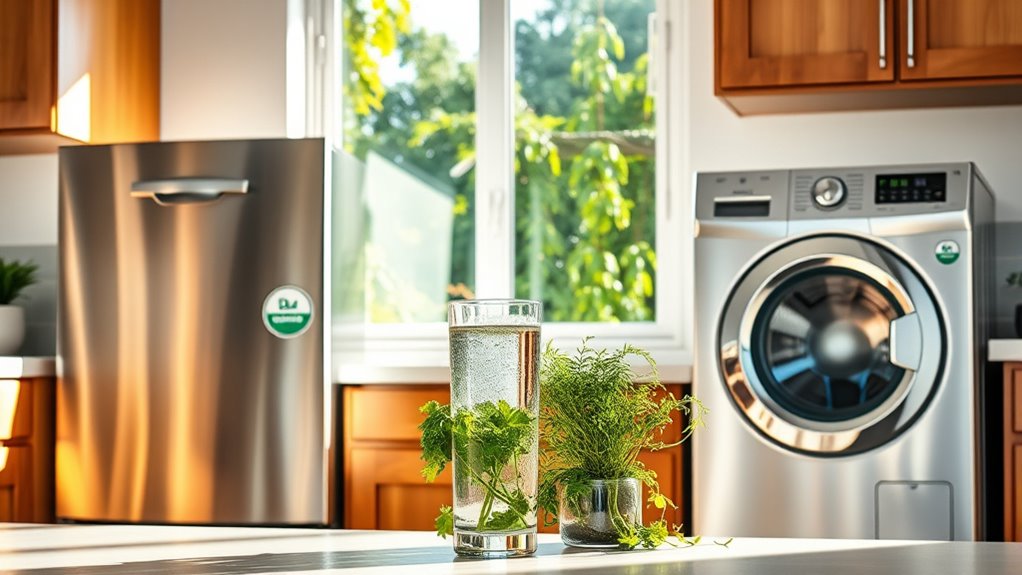
After tackling leaks, consider upgrading to water-efficient appliances to further enhance your conservation efforts.
By choosing ENERGY STAR certified dishwashers and washing machines, you can reduce water consumption by 20-50% compared to older models.
Choosing ENERGY STAR certified dishwashers and washing machines can lower water usage by 20-50% compared to outdated models.
These modern appliances not only save water but also lower your utility bills, with potential annual savings of around $350 for a typical household.
High-efficiency water heaters can cut your water heating costs by up to 30% while conserving water.
Investing in water-efficient appliances is a smart move, as they use advanced technology to optimize water usage without sacrificing performance.
Plus, by reducing your water consumption, you help protect local water sources and lessen the demand on wastewater treatment facilities.
Limit Shower Time
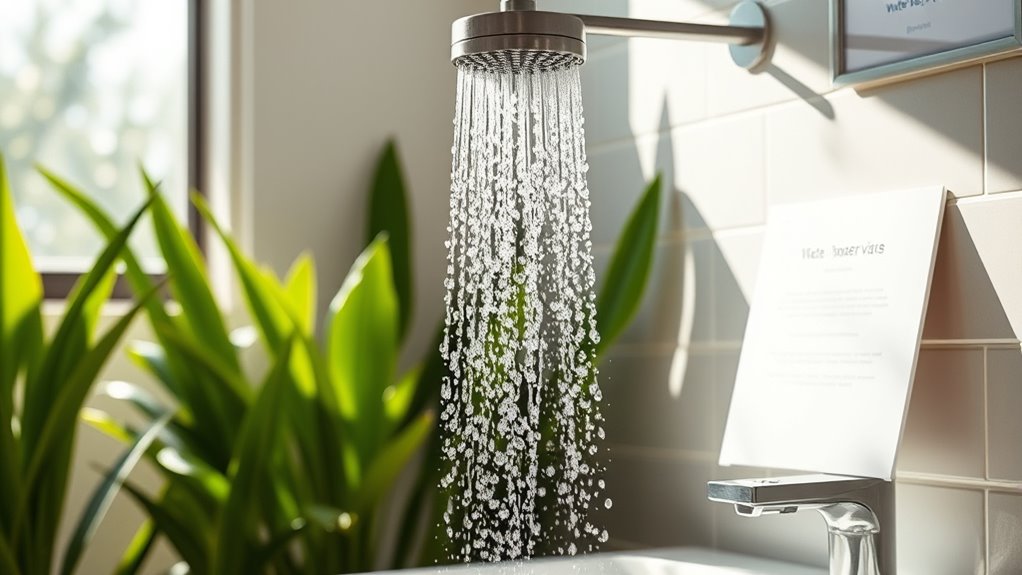
You can make a big impact on water conservation by shortening your shower to just 5-10 minutes.
Consider installing low-flow showerheads to cut down on water usage even further.
These simple adjustments not only save water but also lower your energy bills.
Shorten Shower Duration
While it might be tempting to linger in the shower, shortening your shower duration to just 5-10 minutes can make a significant difference in water conservation. Each minute you cut can save up to 25 gallons of water per shower, leading to a meaningful impact during dry seasons.
Here are some strategies to help you save water:
- Set a timer to keep your shower within the limit.
- Encourage family members to adopt shorter shower habits.
- Consider using a water-saving app to track your usage.
- Reflect on how reducing shower time lowers energy bills too.
Install Low-Flow Showerheads
Shortening your shower duration is an effective way to conserve water, and installing low-flow showerheads can enhance those efforts even further.
These fixtures can reduce water usage by up to 50%, using just 1.5 gallons per minute compared to traditional models that waste 2.5 gallons or more.
By keeping your showers to 5-10 minutes, you can save approximately 12-25 gallons per shower, which adds up quickly, especially in larger households.
Plus, low-flow showerheads maintain great water pressure, so you won't sacrifice comfort while you save water.
Encourage your family to adopt shorter shower habits, and you'll see significant water savings.
Upgrading not only benefits the environment but also lowers your utility bills, contributing to overall savings.
Collect and Reuse Water
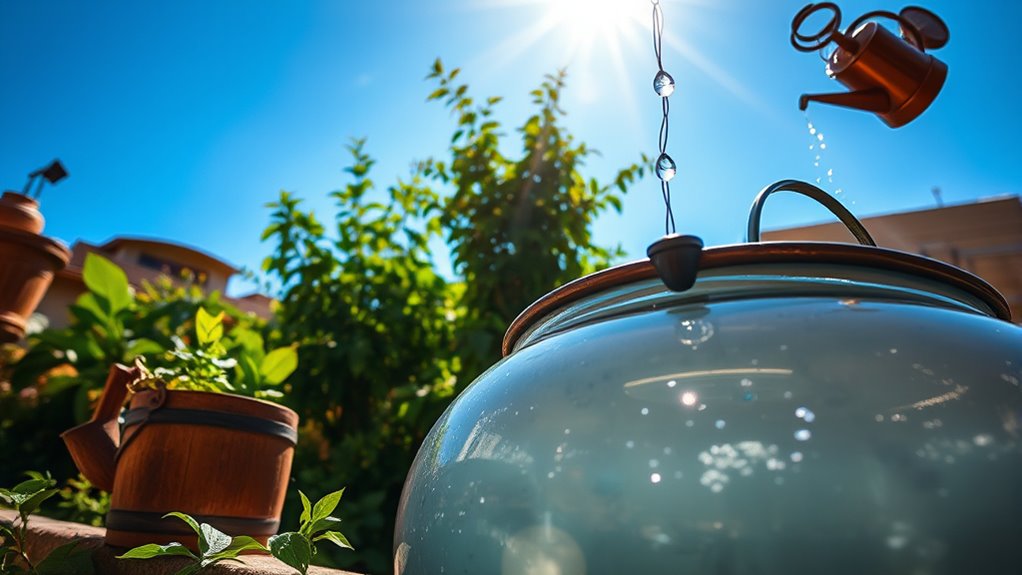
You can greatly cut your water usage by collecting and reusing water around your home.
Setting up rainwater collection systems or greywater reuse techniques not only helps your garden thrive but also reduces your reliance on municipal water sources.
Rainwater Collection Systems
Rainwater collection systems offer an effective way to capture and reuse water, helping you reduce your reliance on municipal sources during dry seasons.
By implementing a rainwater harvesting system, you can save water and make a positive impact on the environment.
Here are some benefits of rainwater collection:
- Collecting rainwater can save an average household approximately 1,300 gallons of water annually.
- Use collected rainwater for irrigation, washing cars, or flushing toilets.
- Direct runoff from roofs and gutters into storage containers for clean, accessible water.
- Mitigate stormwater runoff, reducing the risk of flooding and erosion.
Greywater Reuse Techniques
While many people focus on harvesting rainwater, greywater reuse techniques can also play an essential role in conserving water.
Greywater, sourced from sinks, showers, and laundry, can be redirected for irrigation, helping you save water and reduce your overall consumption. You can easily implement simple methods like redirecting sink or shower drainage into your garden or using buckets to collect water.
Just remember to check local regulations, as some areas have specific guidelines for safe use. A typical family can save approximately 40 gallons of greywater daily, which not only cuts down on usage but also enriches soil health, thanks to the nutrients in greywater.
Applying it correctly can provide substantial benefits for your plants.
Water Storage Solutions
To effectively conserve water, exploring storage solutions like collecting and reusing water can make a significant difference.
Here are some effective water-saving tips for you to contemplate:
- Collect rainwater in barrels or containers to reduce reliance on fresh water for gardening.
- Implement greywater systems to recycle water from dishwashing or showering for irrigation.
- Use rain barrels to manage runoff and prevent erosion while watering your garden.
- Monitor your usage; reusing greywater can cut household water consumption by up to 50%.
These water storage solutions not only promote conservation during dry seasons but also contribute to both individual and community efforts in sustaining our precious water resources.
Start today, and you'll make a positive impact!
Water Plants Wisely

Watering your plants wisely is essential for both their health and efficient water use. To maximize efficiency, consider using an irrigation system like soaker hoses or drip irrigation that directly targets the roots. Water early in the morning or late in the evening to minimize evaporation losses. Here's a quick guide to help you:
| Time of Day | Method | Benefits |
|---|---|---|
| Early Morning | Drip Irrigation | Directly waters roots |
| Late Evening | Soaker Hoses | Reduces evaporation |
| Anytime (if needed) | Targeted Watering | Avoids surface saturation |
Implement Mulch
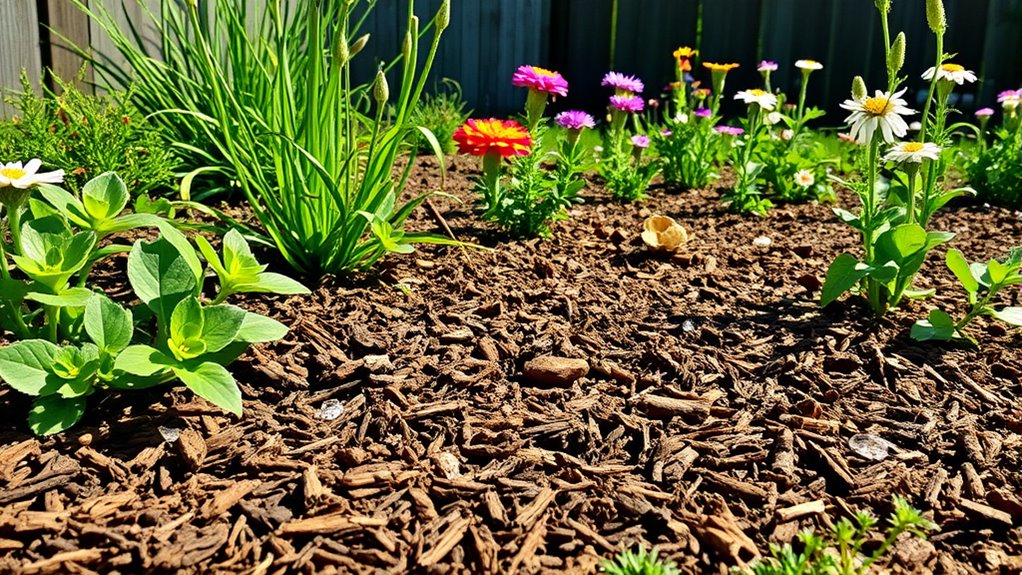
Implementing mulch in your garden is a simple yet effective way to conserve water and support plant health. By applying a layer of mulch, you can markedly reduce soil moisture evaporation and keep your plants thriving during dry seasons.
Here are some benefits of using mulch:
- Reduces watering frequency by retaining moisture in the soil.
- Improves soil health as organic mulch breaks down, enriching your garden with nutrients.
- Regulates soil temperature, protecting roots from extreme heat.
- Suppresses weed growth, minimizing competition for water and nutrients.
Educate Your Community
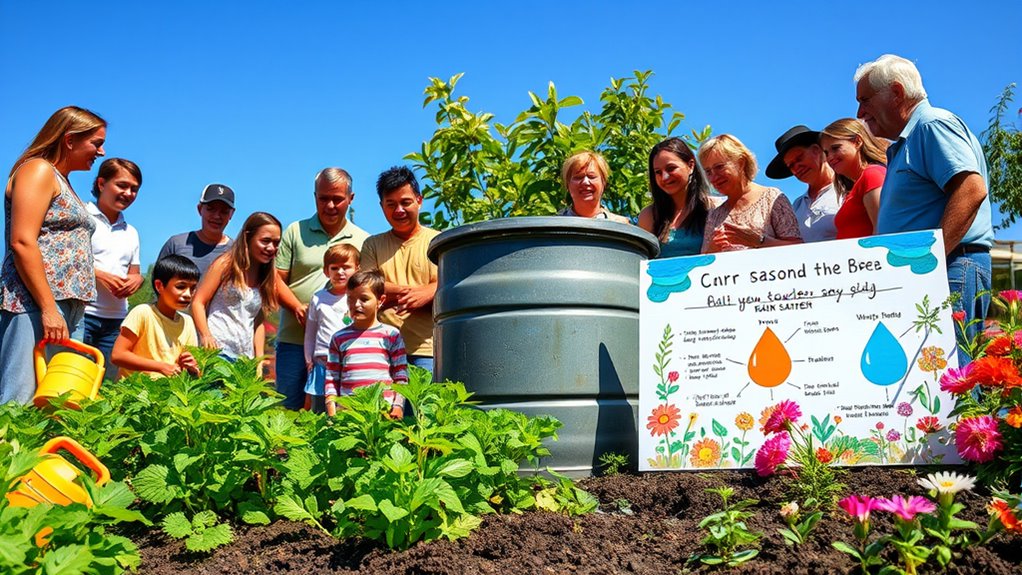
How can you make a real difference in your community's approach to water conservation? Start by sharing water-saving tips with your neighbors. Organize local workshops that empower residents with practical strategies for saving water at home and in gardens. Collaborate with schools to educate younger generations on sustainability. Utilize social media to spread messages about responsible water use.
Consider starting initiatives like "water-saving weeks" to motivate households.
| Action | Impact | Community Benefit |
|---|---|---|
| Host workshops | Increase awareness | More informed residents |
| Use social media | Reach wider audience | Broader engagement |
| Partner with schools | Educate future generations | Sustainable culture |
| Launch community challenges | Encourage participation | Collective water savings |
Together, you can inspire lasting change!
Frequently Asked Questions
How Can We Save Water During Dry Season?
To save water during dry seasons, you can start by fixing any leaks in your home.
It's amazing how much water you'll save! Consider upgrading to water-efficient appliances, which can cut your water use greatly.
When watering your garden, do it early in the morning or late in the evening to reduce evaporation.
Finally, think about collecting rainwater for irrigation; it's a sustainable way to keep your plants thriving.
What Are the 5 R's of Water Conservation?
Have you ever thought about how much water you could save?
The 5 R's of water conservation are crucial:
- Reduce your usage by fixing leaks immediately;
- Reuse greywater from activities like showering;
- Recycle rainwater by collecting it;
- Respect water by prioritizing essential uses;
- Reassess your landscaping choices to include drought-resistant plants.
What Are Some Ways to Conserve Water During a Drought?
To conserve water during a drought, start by fixing leaks immediately; they waste more water than you might think.
Upgrade to water-efficient appliances to cut down on usage.
Collect rainwater for your garden and reuse greywater from washing dishes.
Use smart watering techniques—water early in the morning or late in the evening to reduce evaporation.
Finally, educate your community about these practices, creating a collective effort to save water effectively.
What Are 10 Ways Water Can Be Conserved?
Imagine a world where every drop counts, shimmering like precious gems in the sun.
You can conserve water in ten impactful ways: fix leaks swiftly, upgrade to efficient appliances, and shorten your showers.
Use low-flow showerheads, collect rainwater, and recycle greywater.
Embrace xeriscaping with drought-resistant plants, install drip irrigation, cover pools, and only run dishwashers when full.
Each small action you take creates a ripple effect, conserving water for future generations.
Conclusion
As the sun blazes down and the ground cracks beneath your feet, remember that every drop counts. By fixing leaks, embracing water-efficient appliances, and nurturing your garden with care, you can transform your space into a thriving oasis, even during the driest seasons. Picture lush greenery thriving under a gentle sprinkle, while you educate others to join the cause. Together, let's turn the tide on water waste and cultivate a sustainable future for our parched earth.

